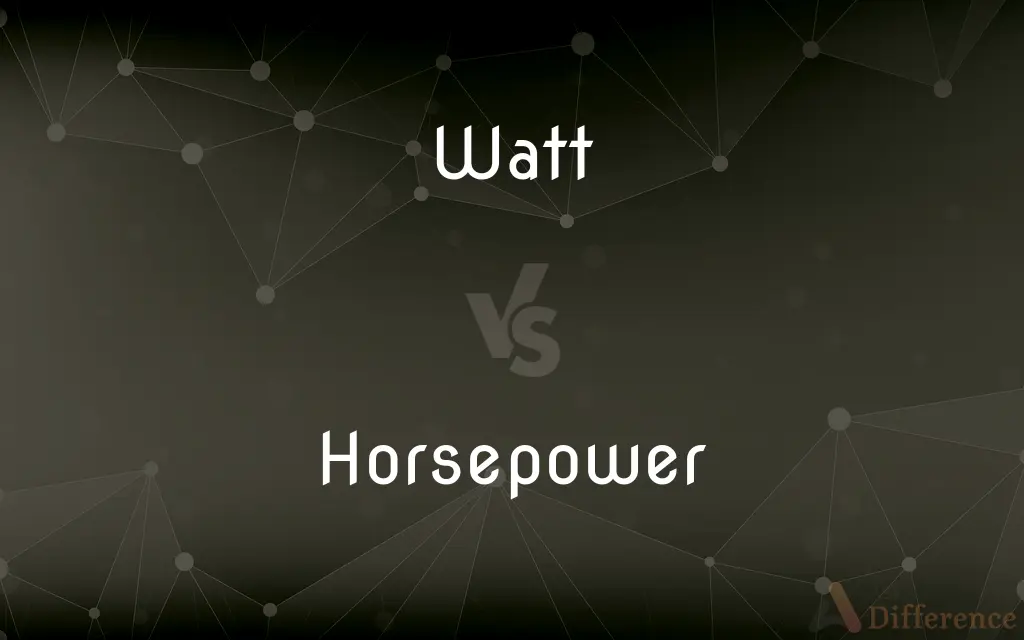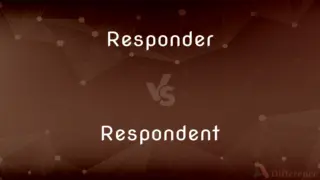Watt vs. Horsepower — What's the Difference?
By Tayyaba Rehman — Updated on October 24, 2023
A "Watt" measures electric power, equivalent to one joule per second, while "Horsepower" gauges mechanical or engine power, traditionally based on the power of one horse.

Difference Between Watt and Horsepower
Table of Contents
ADVERTISEMENT
Key Differences
Both "watt" and "horsepower" are units of power, but they have distinct origins and applications. The term "watt" is named after James Watt, the Scottish engineer. It quantifies electric power and measures the rate of energy transfer or conversion. One watt is equivalent to one joule per second. "Horsepower," on the other hand, is a unit that assesses the power of engines and machinery. Originating from the 18th century, the term was used by James Watt to compare the output of steam engines with the power of draft horses.
In the realm of electricity, "watt" reigns supreme as the standard unit. Everything from light bulbs to appliances uses watts to specify their energy usage or output. Conversely, "horsepower" is a unit more common in the automotive and machinery industries. Car engines, for instance, often have their strength rated in horsepower to give a tangible measure for potential buyers.
It's fascinating how both "watt" and "horsepower" are connected historically to James Watt. Yet, while watt became central in the electrical world, horsepower remained dominant in describing mechanical prowess. Conversions exist between the two: approximately 746 watts equal one horsepower, bridging the gap between electrical and mechanical domains.
Although both terms represent power, their prevalent applications make them unique. While "watt" quantifies the capability of electrical devices, "horsepower" emphasizes the potency of mechanical engines. Each has cemented its place in its respective field, providing clarity and consistency in power measurement.
Comparison Chart
Definition
A unit of electric power.
A unit of mechanical or engine power.
ADVERTISEMENT
Equivalent
Equals one joule per second.
Traditionally approximated to the power of one horse.
Common Usage
Electrical appliances and devices.
Engines, machinery, automotive industry.
Origin
Named after James Watt.
Coined by James Watt to compare steam engines to horse power.
Conversion to the Other
1 horsepower is approximately 746 watts.
1 watt is 1/746th of a horsepower.
Compare with Definitions
Watt
A unit of power in the International System of Units (SI).
The light bulb is rated at 60 watts.
Horsepower
A unit for measuring the power of engines.
The car boasts an engine with 300 horsepower.
Watt
Unit used to quantify electrical power.
The computer's power supply is rated for 500 watts.
Horsepower
Commonly used in the automotive industry.
Buyers often consider horsepower when purchasing a new vehicle.
Watt
Measure of the rate of energy conversion or transfer.
That device consumes 1000 watts per hour.
Horsepower
Approximately equivalent to 746 watts.
This electric motor has an output equivalent to 2 horsepower, or roughly 1492 watts.
Watt
The watt (symbol: W) is a unit of power or radiant flux. In the International System of Units (SI), it is defined as a derived unit of (in SI base units) 1 kg⋅m2⋅s−3 or, equivalently, 1 joule per second.
Horsepower
Originated to compare the power of steam engines with horses.
In the past, five horses were used where we might use an engine with five horsepower today.
Watt
The SI unit of power, equivalent to one joule per second, corresponding to the rate of consumption of energy in an electric circuit where the potential difference is one volt and the current one ampere.
Horsepower
Represents the rate at which work is done.
The motor's continuous horsepower ensures the machinery runs efficiently.
Watt
An SI-derived unit of power equal to one joule per second. See Table at measurement.
Horsepower
Horsepower (hp) is a unit of measurement of power, or the rate at which work is done, usually in reference to the output of engines or motors. There are many different standards and types of horsepower.
Watt
In the International System of Units, the derived unit of power; the power of a system in which one joule of energy is transferred per second. Symbol: W
Horsepower
An imperial unit of power equal to 550 foot-pounds per second (about 750 watts).
Watt
A unit of power or activity equal to 107 C.G.S. units of power, or to work done at the rate of one joule a second. An English horse power is approximately equal to 746 watts.
Horsepower
Abbr. hp A unit of power in the US Customary System, equal to 745.7 watts or 33,000 foot-pounds per minute.
Watt
A unit of power equal to 1 joule per second; the power dissipated by a current of 1 ampere flowing across a resistance of 1 ohm
Horsepower
The power exerted by a horse in pulling.
Watt
Scottish engineer and inventor whose improvements in the steam engine led to its wide use in industry (1736-1819)
Horsepower
(Informal) Effective strength
Political horsepower.
Computer horsepower.
Watt
Equivalent to one joule per second.
The heater has an output of 1500 joules per second, or 1500 watts.
Horsepower
(uncountable) Power derived from the motion of a horse.
Watt
Commonly used in electronics and electrical appliances.
Make sure the adapter can handle the wattage of the appliance.
Horsepower
A nonmetric unit of power (symbol hp) with various definitions, for different applications. The most common of them is probably the mechanical horsepower, approximately equal to 745.7 watts.
Horsepower
A metric unit (symbol often PS from the German abbreviation), approximately equal to 735.5 watts.
Horsepower
(uncountable) Strength.
Political horsepower
Horsepower
A unit of power equal to 746 watts
Common Curiosities
Do both "watt" and "horsepower" measure power?
Yes, both are units of power but used in different contexts.
Is "horsepower" still used in modern times?
Yes, especially in the automotive and machinery industries to denote power.
Does a device using more watts consume more electricity?
Yes, higher watts typically mean more energy consumption.
Is "watt" primarily for electric devices?
Yes, watts are commonly used to quantify the power of electrical devices.
Can a machine have both electric wattage and mechanical horsepower ratings?
Yes, especially if it has both electrical and mechanical components.
Does one horsepower always equate to the power of one horse?
Not precisely; it's an approximation based on early engine comparisons.
What's more potent, a 500-watt motor, or a 1 horsepower motor?
The 1 horsepower motor, as it's approximately equivalent to 746 watts.
Where did the term "horsepower" originate?
It was coined by James Watt to compare steam engines' power to that of a horse.
Are higher watts or horsepower always better?
Not necessarily; it depends on the efficiency and need of the application.
Can I convert watts to horsepower?
Yes, approximately 746 watts equal one horsepower.
Why was "horsepower" needed as a unit?
It gave a tangible measure, comparing engines to the familiar power of a horse.
In everyday life, which term might I encounter more?
It depends on the context; "watt" for electric devices and "horsepower" for vehicles or machinery.
Do all countries use watts for electrical measurements?
Mostly, as the watt is the SI unit for power.
Is "watt" named after James Watt?
Yes, the term "watt" honors his contributions to the development of the steam engine.
Is "kilowatt" related to "watt"?
Yes, a kilowatt represents 1,000 watts.
Share Your Discovery

Previous Comparison
Responder vs. Respondent
Next Comparison
Finalise vs. FinalizeAuthor Spotlight
Written by
Tayyaba RehmanTayyaba Rehman is a distinguished writer, currently serving as a primary contributor to askdifference.com. As a researcher in semantics and etymology, Tayyaba's passion for the complexity of languages and their distinctions has found a perfect home on the platform. Tayyaba delves into the intricacies of language, distinguishing between commonly confused words and phrases, thereby providing clarity for readers worldwide.














































